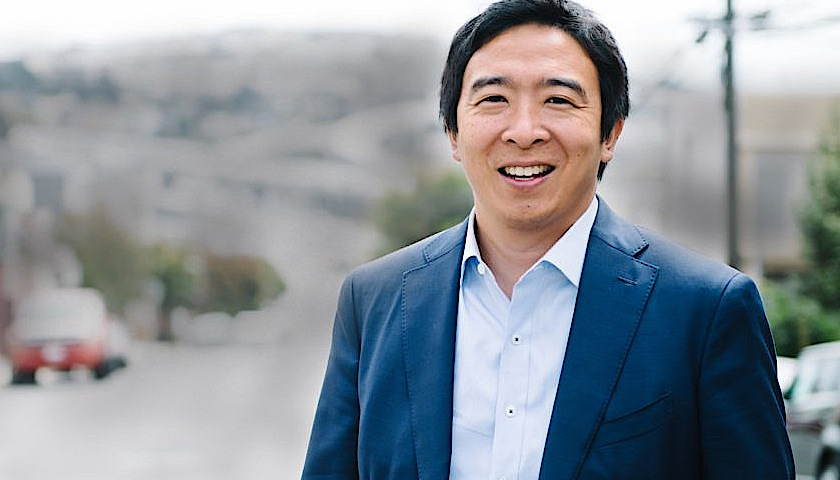by Peter Hasson
New York entrepreneur and Democratic 2020 candidate Andrew Yang wants to implement a system in which a government-run mobile app rewards Americans with “digital social credits’ (DSCs) for good behavior.
Americans would receive DSCs under Yang’s system for things such as “participating in a town fair,” “fixing a neighbor’s appliance” or “tutoring a student,” his presidential campaign website explains.
 “As individuals rack up DSCs, they would have both a permanent balance they’ve earned over their lifetime and a current balance. They could cash the points in for experiences, purchases with participating vendors, support for causes, and transfer points to others for special occasions,” Yang states on his website. “As their permanent balance gets higher, they might qualify for various perks like throwing a pitch at a local ballgame, an audience with their local Congressperson or meeting their state’s most civic-minded athlete or celebrity.”
“As individuals rack up DSCs, they would have both a permanent balance they’ve earned over their lifetime and a current balance. They could cash the points in for experiences, purchases with participating vendors, support for causes, and transfer points to others for special occasions,” Yang states on his website. “As their permanent balance gets higher, they might qualify for various perks like throwing a pitch at a local ballgame, an audience with their local Congressperson or meeting their state’s most civic-minded athlete or celebrity.”
“The most socially detached would be the most likely to ignore all of this,” he added. “But many people love rewards and feeling valued.”
Yang’s social credit plan bears some similarities to the social credit system implemented by China’s authoritarian government.
Every citizen in China is assigned a social credit score that determines whether they can buy plane or train tickets.
Unlike the Chinese system, Yang’s plan does not include using digital social credit for punitive measures.
Campaign chair Matt Shinners emphasized in an email to The Daily Caller News Foundation that Yang’s system lacks the coercive element featured in China’s social credit system:
My understanding of the Chinese system (which is admittedly limited) is that it’s more of a rating that’s externally imposed based on a number of non-opt-in factors, almost like a credit rating, and collates information captured from public surveillance, economic and social media activity, etc… to create a ‘score’ that would then, possibly, be used to ‘blacklist’ people from certain activities. Under my understanding, the Chinese system is more of a score/rating than a system of credits.
Andrew’s platform calls for a system that’s much more akin to time banking, or to points that people earn on their credit cards. There’s no general monitoring of individual activity, and no scraping of social media sites to see what people are up to. Instead, activities such as volunteering or helping your neighbors would earn you credits that could then be traded with others for receiving similar help. For example, I spend 4 hours/week coaching a hockey team in my community, and I use the credits I earn to have a local electrician (who possibly has a kid on the team) help me install a garage door opener. There would also be backing by the federal government for conversion to currency (that would be taxed), or traded in for “fun” activities (such as getting to attend a bill signing).
Yang, a lifetime New Yorker, faces an uphill battle in a crowded Democratic primary.
Though he hasn’t received much media attention, Yang’s campaign is actually in its ninth month. The candidate is currently on a national tour he labeled the “Humanity First Tour.”
In addition to the social credit system, Yang’s platform also calls for paying every American a universal basic income of $1,000 a month and government-sponsored journalism.
– – –
Peter Hasson is a reporter for the Daily Caller News Foundation. Follow Hasson on Twitter @PeterJHasson.
Photo “Andrew Yang” by Andrew Yang for President.




